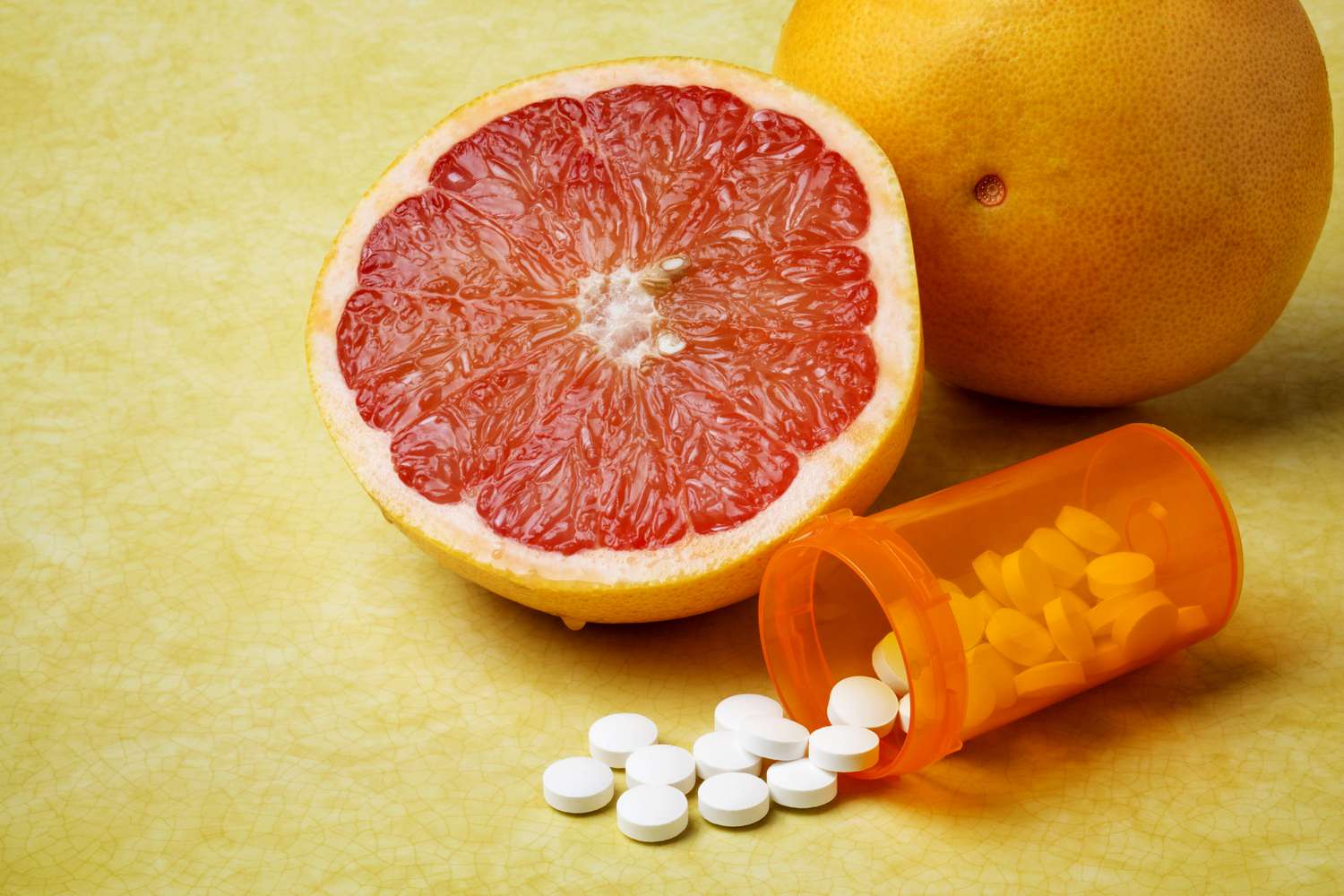
Grapefruit, with its vibrant citrus hues, tangy flavor and uplifting aroma, is a refreshing marvel of the fruit world. It’s like a little burst of sunshine on your plate, providing a tangy punch with each bite of its juicy segments.
But with all of the positives that grapefruit offers, it’s crucial to pucker up to the fact that this zesty citrus fruit plays a peculiar role in how the body metabolizes certain medications. Understanding these interactions is key to taking your prescriptions safely and reducing the risk of medication side effects. Read on to learn more.
How Grapefruit Affects Medication
Grapefruit May Increase Medication Levels in the Blood
The interaction between grapefruit and certain medications is rooted in the fruit’s impact on enzymes within the body. Specifically, grapefruit and grapefruit juice contain compounds known as furanocoumarins, which inhibit the activity of a specific enzyme called CYP3A4 that plays a critical role in the metabolism of many drugs, according to a review in Molecules in 2024. By inhibiting CYP3A4, grapefruit can prevent certain medications from being broken down as they normally would, according to the Food and Drug Administration. That means that higher-than-intended concentrations of medication may enter the bloodstream or may stay in your body longer, leading to an increased risk of side effects or drug toxicity.
Grapefruit May Enhance Side Effects
Because medication levels in the blood may increase when grapefruit is eaten, you may be more likely to experience side effects—or to have side effects that are more severe. For example, if dizziness is one potential side effect on a standard dose, a higher-than-usual dose may make the lightheadedness or spinning sensation worse. And if a drug may cause digestive upset or headache, these symptoms may move from mild to more severe. Other side effects include abnormal heart rhythms, stomach bleeding, muscle pain, kidney damage, low blood pressure, difficulty breathing and sedation, according to an overview in The Journal for Nurse Practitioners in 2020.
Grapefruit May Block Drug Absorption
Grapefruit doesn’t just amplify levels of medications in your blood—sometimes the fruit can decrease them. Grapefruit contains substances that can inhibit certain drug transporters found in the intestines, specifically one called organic anion-transporting polypeptides (OATPs), according to the overview mentioned above. OATPs are essential for absorbing various medications into the body’s cells, which is an important step for your body to use the drug. When these transporters are blocked by grapefruit compounds, your body may not absorb enough of the drug it needs to do its job, and it may not be as effective.
Medications Affected by Grapefruit
According to the FDA, the below is a sampling of drugs that can interact with grapefruit juice:
- Statins, which lower cholesterol, including Zocor (simvastatin) and Lipitor (atorvastatin)
- High blood pressure medications Procardia and Adalat CC (nifedipine)
- Organ-transplant rejection drugs, such as Neoral and Sandimmune (cyclosporine)
- Anti-anxiety drugs, including BuSpar (buspirone)
- Corticosteroids for Crohn’s or ulcerative colitis Entocort EC and Uceris tablet (budesonide)
- Abnormal heart rhythm drugs, such as Pacerone and Carodarone tablet (amiodarone)
- Antihistamines like Allegra (fexofenadine)
- Some cough medications contain active ingredients such as dextromethorphan, which can increase the amount of medication in your body, according to Mayo Clinic.
Tips for Managing Grapefruit-Medication Interactions
For those who take medication and enjoy grapefruit, talk to your health care provider and ask if the fruit is safe to eat or if it may interact with your prescription or over-the-counter med. This is a question you can ask your pharmacist when picking up your medication. The fine print on medication packaging can also provide essential information about drug interactions, including those involving foods like grapefruit.
Even if there is an interaction, you may still be able to enjoy grapefruit or grapefruit juice. Sometimes waiting several hours between taking your medication and eating the citrus can decrease the risks, but clear this with your provider first.
If your provider recommends against grapefruit, they can suggest other subs that are safer. For example, oranges and orange juice, though similar in flavor, typically do not contain the same furanocoumarins that cause drug interactions as grapefruit. Tangerines and clementines are also generally considered safe. Of course, look outside of citrus and toward other fruits, like apples, pears or berries and have those with your breakfast or snack instead. Baked Apple Oatmeal or Pecan Butter & Pear Toast are other ways to fit in fruit in the morning.
Another note of caution, the FDA points out that Seville oranges (often used to make orange marmalade), pomelos and tangelos (a tangerine-grapefruit hybrid) may interact with meds similarly to grapefruit. If you’re advised to avoid grapefruit, skip these, too.
Bottom Line
Grapefruit is one of the most well-known foods that interacts with common medications. In certain instances, it can increase levels of the drug in your body or cause the drug to linger around longer in your system. Other times, grapefruit actually decreases absorption, lessening effectiveness. If you’re taking prescription or over-the-counter medication, ask your doctor or pharmacist if grapefruit is safe for you to eat. And if grapefruit is off the table (har, har) alternative fruits such as oranges, tangerines and clementines, as well as apples, pears and berries may be delicious—and safer—options.
